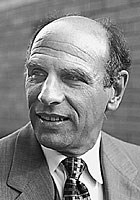Two recent grants to faculties at the far geographic reaches of the University demonstrate the diversity and scale of Harvard's life-sciences expertise. Each also illustrates the institutional collaborations required for contemporary biological and medical research.
 |
| Dennis L. Kasper |
| Photo by Graham Ramsay |
At the applied end of the scientific spectrum, Dennis L. Kasper, Channing professor of medicine and professor of microbiology and molecular genetics, will become scientific director of the New England Center on Biodefense and Emerging Infectious Diseases, based at Harvard Medical School. The center, one of eight established nationwide with a total of $350 million of National Institutes of Health funding during the next five years (roughly $45 million for each venue), will conduct research and training focused on vaccines and therapies for anthrax, botulism, SARS, West Nile, and other infectious diseases. Each center will operate core laboratory facilities for other academic and biotechnology-business researchers in its region, and will assist public officials in case of biodefense or naturally occurring biological emergencies. Boston University, the University of Massachusetts Medical School, and other institutions will conduct four of the center's nine initial research programs. (School of Public Health dean Barry R. Bloom's perspective on the challenges of bioterrorism research in an academic setting appears here.)
In Cambridge, Andrew W. Murray, professor of molecular and cellular biology and director of the Bauer Center for Genomics Research, will lead a new five-year, $15-million study of "modular biology"collections of genes or proteins that work together to carry out a biological function. The study, funded by the National Institute of General Medical Sciences, creates a "center of excellence in complex biomedical systems research." (A similar center, focused on computational and systems biology, was funded at MIT.) Basing the project at the Bauer Center emphasizes its interdisciplinary nature: the current fellows working there are trained in mathematics, physics, computational biology, and diverse biological disciplines. Other collaborators come from several Harvard departments, including computer science and chemistry and chemical biology; the medical school; and institutions from Stanford to Hebrew University of Jerusalem.





